
PayPal has officially launched its PYUSD stablecoin on the Solana blockchain, enhancing transaction speed and cost efficiency while expanding its cryptocurrency offerings beyond Ethereum.
Strategic Move Despite Solana’s Troubles
PayPal has officially launched its PYUSD stablecoin on the Solana blockchain, marking the first expansion of PYUSD beyond Ethereum. This move underscores PayPal's strategic commitment to broadening its cryptocurrency offerings following the successful launch of PYUSD on Ethereum in August 2023.
PayPal considered Solana’s significant commercial use cases before choosing it for the expansion of PYUSD. The company noted that Solana is the most used blockchain for stablecoin transfers, which supports PayPal's objective to enhance PYUSD's commercial applications. Although Solana has faced challenges with network shutdowns in the past, its efficiency and cost-effectiveness in processing transactions make it an appealing choice for stablecoin operations.
Leveraging Solana's Capabilities
Solana's integration is a significant step due to its high throughput and cost-effective transaction capabilities. By leveraging Solana, PayPal aims to enhance the efficiency and affordability of PYUSD transactions. Solana's blockchain supports up to 65,000 transactions per second at a minimal cost of $0.0025 per transaction, a stark contrast to Ethereum's 15 transactions per second and fees that can reach $50 during peak congestion.
Solana facilitates confidential transfers, ensuring transaction amounts remain private while meeting regulatory standards. It also supports transfer hooks for adding custom functionality during token transfers and memo fields for including additional information with payments. These features are pivotal for expanding the utility and use cases of PYUSD in commercial scenarios.
PayPal’s Three-Step Adoption Approach
PayPal is following a proven three-step approach to ensure the mainstream adoption of PYUSD, focusing on awareness, utility, and ubiquity.
The initial awareness phase began with the release of PYUSD on Ethereum. PayPal and Venmo apps were instrumental in introducing over 100 million US users to PYUSD, targeting early adopters who play a crucial role in spreading the word about the new stablecoin.
In the utility phase, PayPal emphasizes making PYUSD practical for everyday use. Its launch on Solana addresses this by ensuring transactions are fast and inexpensive, which are critical factors for daily financial activities.
The final ubiquity phase aims for PYUSD to become a ubiquitous payment method integrated into conventional applications. This involves ensuring seamless and cost-effective transactions across a decentralized multi-chain architecture, promoting PYUSD as a natural part of everyday financial interactions.
Disclaimer: This article is provided for informational purposes only. It is not offered or intended to be used as legal, tax, investment, financial, or other advice.
* This article was originally published here

No comments:
Post a Comment